Updated August 3, 2022
Did you just find out you are pregnant with twins?
Congratulations!
You may be wondering what questions to ask your doctor if you are having twins.
We asked our OB/GYN the most important questions you should ask your doctor or midwife if you are having twins.
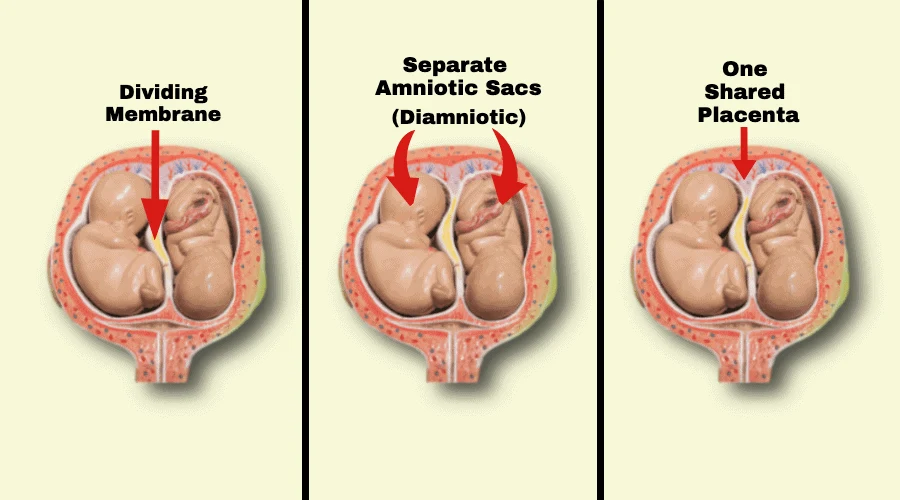
You will certainly have many questions to ask your doctor if you are having twins.
This is normal as there are a number of important details you will want to know.
It is best to ask the questions listed in this article as soon as you are aware you are having twins.

You will have many additional questions about how twins differ from a singleton pregnancy and will be able to get answers from excellent online resources, including authority medical websites and books on Amazon.
Questions such as:
- How does my diet, rest requirement, weight gain, and breastfeeding differ with twins?
- What lifestyle changes will I have to make?
- What pregnancy problems are more common with twin pregnancies?
There are many details obtained when an ultrasound is performed, which will determine how your twin pregnancy will be managed.
- The number of placentas
- The membranes (amnion and chorion)
- Amount of amniotic fluid around each baby
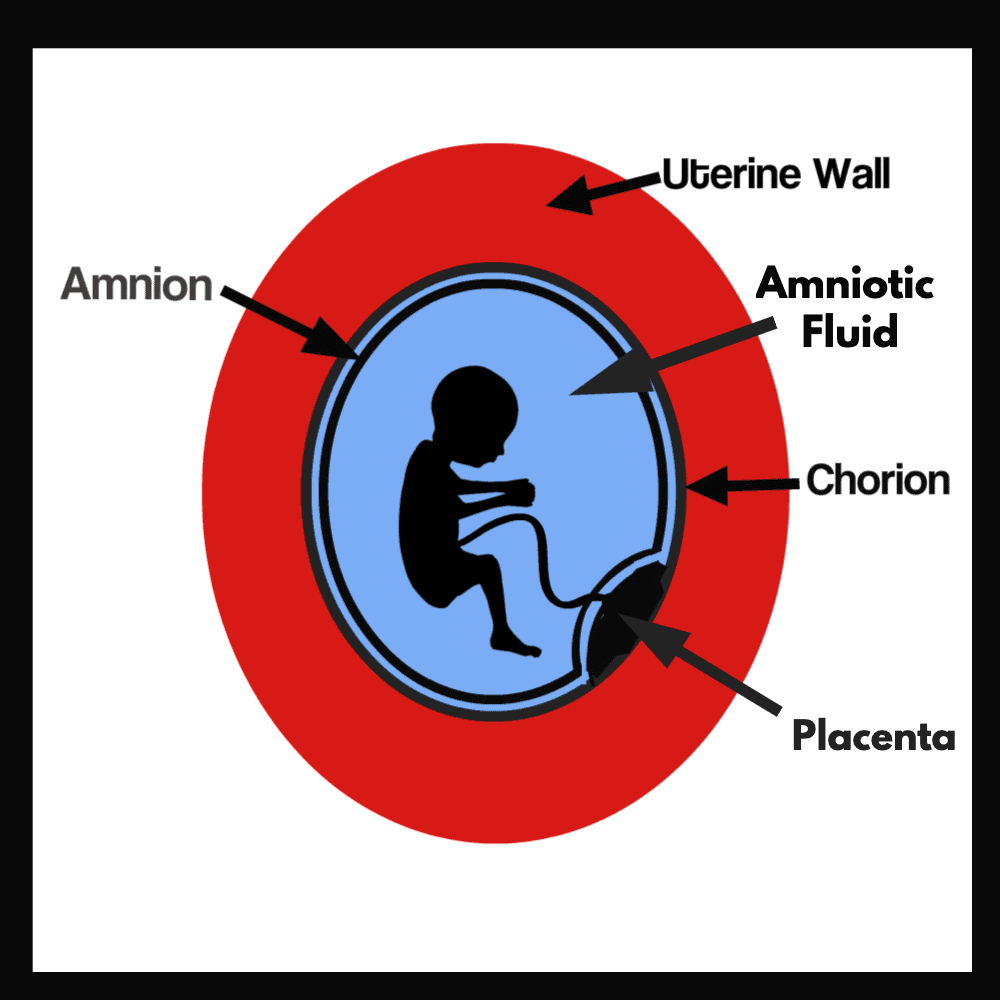
Amniotic Membrane:
The inner membrane around each baby is called the amniotic membrane.
In a twin pregnancy, this membrane serves an important function.
It keeps each baby in a separate sac so their umbilical cords cannot get entangled.
For singleton pregnancies, the illustration above shows the inner amniotic membrane.
NOTE: Though cord entanglement is not common with one baby, there are occasions where the umbilical cord can still be a problem.
Two such instances are:
- If the cord wraps around the baby’s neck (nuchal cord)
- If the random fetal activity during pregnancy, especially early on, by chance develops a true knot in the cord.
True knots are not a problem as long if they do not tighten.
The time when they can present a problem is in labor, as the baby descends the birth canal and pulls on the cord.
Fortunately, fetal monitoring during labor will show a drop in the fetal heart rate and if you are not imminently going to deliver, a cesarean section can be done to quickly restore normal blood flow to your baby.
Chorionic Membrane:
The chorionic membrane is the outer membrane surrounding one or both babies.
Since the amniotic membrane is the outside membrane, so it is not the membrane that will determine if the babies will be in separate sacs.
Placenta:
The placenta is an organ that attaches to the wall of the uterus and is the channel through which the mother can supply oxygen and nutrients to her baby.
The placenta also removes waste products from your baby’s blood.
This circulation is called maternal-fetal circulation or uteroplacental circulation.
With twins, there can be one or two placentas based on what occurs during the early stages of development.
If there is one placenta for each baby the supply of nutrients will be separate from the other baby.
However, if there is only one placenta feeding both babies, the delivery of oxygen and nutrients to each baby can be unequally distributed and this can result in what is called discordant growth.
Gestational Sac:
The collection of fluid surrounding the developing embryo and baby.
The term is most often used to describe the gestational sac seen inside the uterus as early as 5 weeks.
Dividing Membrane:
The dividing membrane is a term used to describe the membranes discussed above.
The only situation that is concerning is when the twin pregnancy is monoamniotic as this allows the twins to entangle.
- Dichorionic-Diamniotic
- Monochorionic-Diamniotic
- Monochorionic-Monoamniotic
What Questions To Ask Your Doctor If You Are Having Twins
1. How many placentas are present on the screening ultrasound?
This will determine if your pregnancy has to be monitored closely with ultrasound for discordant growth (discussed above).
Ultrasound will measure any significant difference in weight between your babies and evaluates the blood flow to each baby.
This type of twin pregnancy requires consultation with or management by a perinatologist (a doctor that specializes in the management of high-risk pregnancies).
When there is discordant growth, the timing of delivery is based on a number of factors, including gestational age and ultrasound findings.
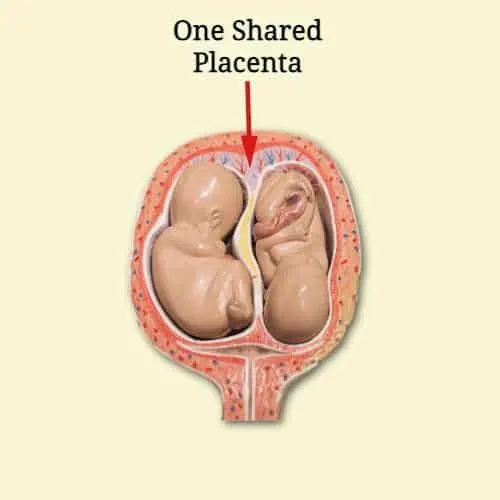
Twins are sharing one placenta.
This is called a monochorionic twin pregnancy and the chance of identical twins is 70%.
2. Is there a dividing membrane between the babies?
Fortunately, the vast majority of twin pregnancies have two amniotic sacs.
However, if there is only one sac (monochorionic-monoamniotic), there is the risk of umbilical cord entanglement.
A perinatologist will need to perform frequent ultrasounds to monitor fetal wellbeing, blood flow, and ultimately the timing of delivery.
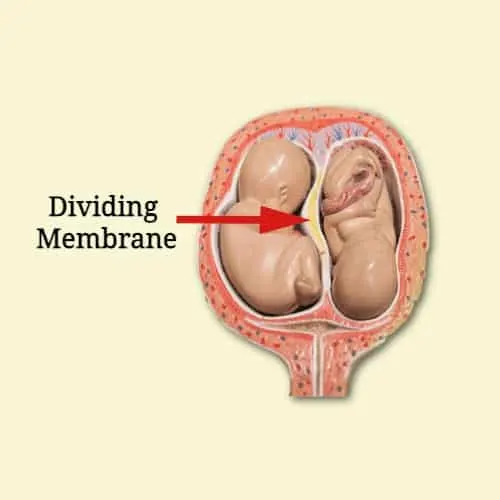
A Dividing membrane means there are two amniotic sacs.
The advancements in ultrasound and blood flow evaluation continue to improve the management of high-risk obstetric patients with the findings discussed above.
- Birth weight differences.
- Amniotic fluid volume.
- Umbilical cord blood flow
- Twin-twin transfusion syndrome (This occurs when blood flow is channeled to one baby more than the other leading to growth discrepancies.)
[content-egg module=Amazon template=grid next=3 hide=price cols=3]
3. Do you prefer to deliver twins by cesarean section?
Though advocates of vaginal delivery may disagree with asking this question, there is no right or wrong answer.
The decision will depend on one’s personal philosophy and beliefs about pregnancy management.
Addressing this question as soon as you know you are having twins will prevent any conflict when you approach the time for your delivery.
Though obstetric care is always trying to decrease the cesarean section rate, choosing to have an elective cesarean section for twins is an accepted management plan.
As a physician, I believe it is important to mention this, as you might not know you have this option depending on who you talk to.
The mode of delivery for twins is largely up to the expectant mother, assuming there is not an urgent or medically necessary reason for a cesarean section.
Twin vaginal deliveries may not go as planned. On more than one occasion I have had one baby deliver vaginally and the other by cesarean section.
To avoid the potential complications that can be associated with twin pregnancies, there are obstetricians who choose to deliver all twins by cesarean section to avoid potential problems with the vaginal delivery of twins.
This is why it is important to have this conversation.
3. Do you consult with a perinatologist when you have a patient with a twin pregnancy?
High-level ultrasound studies done by a perinatologist can measure blood flow to each fetus and fetal growth to watch for discordant growth when there is a single placenta.
Ultrasound monitoring of monochorionic-monoamniotic twins done by a specialist can evaluate to what degree cord entanglement may be affecting blood flow.
Since there is no way to predict or prevent the possibility of a cord accident due to entanglement, delivery of monoamniotic twins is most often arranged prior to full term, around 32 to 33 weeks when the risk of one or both twins dying from early intervention is less than allowing the twins to progress to full term.
The survival rate for babies in a monoamniotic twin pregnancy is around 90%.
Though many obstetricians manage uncomplicated twin pregnancies, there are some who refer patients with twins to maternal-fetal medicine doctors for the following reasons:
- They do not have a perinatologist in their office practice.
- Early ultrasound reveals findings that require the care of a maternal-fetal-medicine doctor.
- The location of the medical practice is not near a tertiary care hospital that is better equipped to deal with multiple gestation pregnancies.
It is important to discuss this concern early during your prenatal care to avoid the potential transfer of your care later in your pregnancy.
5. Does the hospital where I will deliver have a neonatal intensive care nursery?
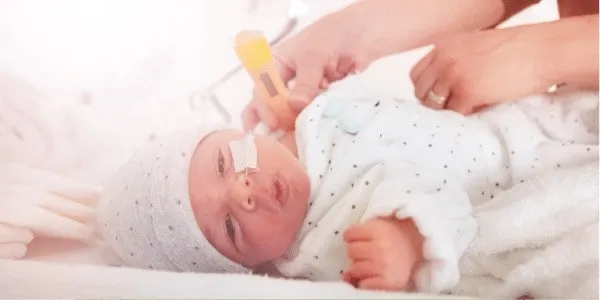
If you have twins, you will want to make sure you deliver at a hospital that can manage potential neonatal problems.
Twins, by definition, are considered high-risk, even though you will very likely not experience serious problems.
When twin pregnancies do have complications, the vast majority will turn out fine if you are managed at a hospital equipped with the services twins may require.
The following are the services you would want to have at the hospital affiliated with the medical practice managing your prenatal care:
- Neonatal intensive care unit (NICU)
- Staff Perinatologist and high-risk obstetrical services (ie. ultrasound)
6. How is anesthesia covered at the hospital where I will deliver?
This question used to be more of a concern years ago.
Fortunately, most hospitals that have maternity care, have a 24-hour obstetric anesthesiologist in the hospital 24 hours a day.
Since it is hard to know what hospital might not have full-time anesthesia coverage, it is best to ask this question early on so you can be reassured that access to anesthesia, if needed or desired is not delayed.

Final Thoughts
You will very likely come up with many more questions to ask your doctor if you are having twins.
We strongly believe that the best way to prevent conflicts during your prenatal care and especially at the time of delivery is to ask any questions you have on your mind at your prenatal visits.
Get information from resources you can trust.
This includes your medical providers and online resources that are established authority sites such as ACOG, ABOG, and the CDC.


